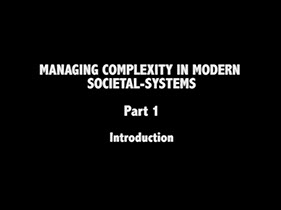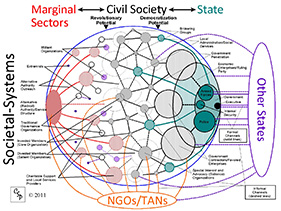Video Book: Societal-Systems Analytics



Managing Complexity in Modern Societal-Systems (A Theory of Everyone)
Monty G. Marshall (author/producer); Eliot Elzinga (videographer), CSP 2014-2016
The historical nature of intellectual inquiry has been subjectively biased toward radical individualism. As one result, scholarship has tended to focus on phenomenological anomalies and particularly on those anomalies perceived to be the most threatening at the personal level. Recent advances in information and computation technologies have enabled researchers to shift the focus of inquiry toward a macro-comparative approach that emphasizes existential commonalities that define societal-systems and provide the contextual basis from which threatening anomalies may arise. Societal-Systems Analytics empower practitioners to better comprehend and map the circumstances that define the human condition (structuration) so that the identification of threatening anomalies (problemation) can be analyzed within their unique context and, in so doing, improve our collective capacity to manage threats and improve the general qualities of human security.
Societal-System Analytics is laid out by utilizing a conceptual visualization presentation of a formal theory of social order and political organization in complex, modern societies: the two-volume "video book" series comprises 20 video "chapters." The Complex Societal-Systems analytic framework is summarized in the "storyboard," outlining the sequence of linked, animated models that are used to illustrate and explain key structural components and dynamic aspects of societal-systems. Each model used in the video series is designed to highlight a key element in a coherent, comprehensive, analytical framework for complex societal-systems at any level of analysis.
Volume 1: Structuration (December 2014)
Part 1: (Simplified) Models of Complex Societal-Systems Denoting Developmental Changes
Part 2: Social Identity Group (Deconstructing Complex Societal-Systems as Common Units)
Part 3: Societal Development Process - Instrumental versus Sociational Strategies
Part 4: Inter-Group (Systemic) Interaction and the Systemic Development Process
Volume 2: Problemation (January 2016)
Part 5: Social Process and the Political Economy of Conflict Management
Part 6: Political Process and the Problem of Polar Factionalism
Part 7: Emotive Content, Political Salience and the Diffusion of Insecurity
To download the Videobook Storyboard, click here.
To view the Video Book on CSP's YouTube page, click here.
The core assumptions that undergird the complex societal-systems analytic framework are:
1) humans are social creatures that naturally organize themselves into self-actuating, self-organizing, self-regulating and self-correcting social identity groups that occupy a (more or less well) territorially-defined "political space"
2) authority within the group can be based on either instrumental (coercive) or sociational (cooperative) strategies or some combination of those strategies (this is the foundational assumption of the Polity scheme)
3) individual humans occupying a particular political space will form linkages (networks) with other individuals and may adopt multiple group identities and shift their loyalty or investment in those groups as a rational function of the group's perceived value to their personal interests and aspirations (i.e., pluralism)
4) the number of social linkages and groups formed within a particular political space is a function of the general level of societal-system development which is, in turn, a function of prevailing technologies
5) sociational strategies are superior to instrumental strategies of authority over the longer term because they are economically efficacious and associationally conducive (the basis for systemic complexity and resilience); and
6) the use of instrumental strategies may be viewed as either symptomatic of a lack of sociational development or essentially problematic as a form of systemic disintegration.
Supporting Documents:
STORYBOARD: Societal-Systems Analytics (Managing Complexity in Modern Societal-Systems)
Third World War: System, Process, and Conflict Dynamics (Marshall, 1999)
Systemic Peacemaking in the Era of Globalization (Marshall, 2012)
Dr. Monty G. Marshall has spent the past thirty years collecting, coding, managing, and analyzing comparative, cross-national, and sub-national data regarding social and political phenomena and aggregated at the global level of analysis; his intellectual and creative contributions include the Minorities at Risk and Polity projects, Integrated Network for Societal Conflict Research, and the Political Instability Task Force. In order to effectively monitor and record comparable information on 167 countries in real-time using open-source information resources, the author has had to develop an intellectual framework that can manage 167 separate baseline, processual threads (one for each country), selectively filter and organize large volumes of information, parse new information to identify changes in specific baseline scenarios and integrate changes into case-specific process tracings while simultaneously monitoring for pattern alterations in behaviors that might affect the analytic framework itself (i.e., evidence of social learning and adaptation within the system).
426 Center St. N, Vienna, VA 22180 USA | 202.236.9298 | CSP 2015